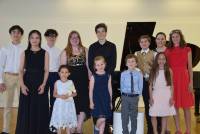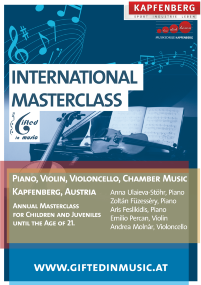My teaching method is is focused on the individual needs of each student and places them at the centre of their education. Each individual is highly gifted with different talents and abilities and has her or his own personal story that leads to a specific approach and personal requirements. In this sense my methods follow the teaching styles of Heinrich Neuhaus and Theodor Leschetizky.
"There was no teaching method. His lectures were much more than a teaching method. It was a process that achieved releasing all the hidden energies of the students. He turned to the power of imagination, taste and individual responsibility. He did not provide a model or an ideal solution. He gave his students a task, a recipe..." *
Artur Schnabel about Theodor Leschetizky's education
At present I lead the highly gifted and preparation class at the University of Music and Performing Arts Graz.
My special concern is the advancement of highly gifted children and juveniles.
As a result of this cooperation we founded the annual masterclass "Gifted in Music" in Kapfenberg.
Gifted in Music - International Masterclass for Children and Juveniles, Kapfenberg - Austria
Annual Masterclass for piano, violin, violoncello & chamber music
for further info please visit our website
My scientific master thesis:
Female pianists on the concert stage – Circumstances and influences in the 19th /20th century
This thesis deals with the development of concert activities of female concert pianists including circumstances and influences from the beginning of the 19th century until today. Starting with social conventions and limitations for women at the beginning of the 19th century, influences and circumstances within the context of social changes are depicted and the origin of professional education institutes for female pianists are illustrated. In addition, the development of modern piano education described, followed by a comparison of the piano teaching methods of Clara Schumann and Theodor Leschetizky. As most relevant female representatives of each piano teaching method the pianists Fanny Davies and Annette Essipoff serve as examples. Their artistic work is revealed by facts of their vita, concert activities and repertoire, as well as by analysis of sound recordings and newspaper reviews. Finally, relevant facts and career circumstances of today´s female concert artists are presented. Download
*Artur Schnabel: Aus dir wird nie ein Pianist, Frankfurt am Main, 1991, S. 162


